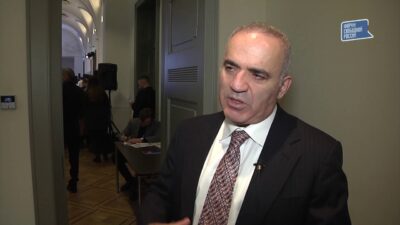The share of supporters of nuclear escalation in the war with Ukraine has grown in Russia. The use of nuclear weapons against the neighboring country is considered acceptable by 39% of citizens, a November poll conducted by the Levada Center showed. By comparison, 34% of respondents held this view in July, and 29% in April 2023.
“Definitely” support a nuclear strike on Ukraine 11% of Russians. Another 28% are inclined to believe that such a move “could rather be justified.” This is a new record since the war began.
The share of those who oppose the use of nuclear weapons fell to 45% from 52% in July. In April 2023, 56% of Russians held such views. Now 21% of respondents categorically reject such a scenario, while another 24% doubt that the decision to launch a nuclear strike on Ukraine could be justified. 15% found it difficult to answer.
Alexei Levinson, head of the social and cultural research department of the Levada Center, called the results of the survey alarming. In his opinion, the “scary talk about the possibility of using nuclear weapons, which the Russian leadership is refreshing,” is to blame. “Gradually [they] lead to an increase in the share of those who believe that this is acceptable, in fact morally justified,” Levinson said at the conference “Country and the World: Russian Realities-2024,” the Agency reports.
From Levinson’s point of view, Russians’ attitudes are also influenced by propaganda, which presents a potential nuclear strike on Ukraine as a demonstration of the state’s power and a way to quickly end the war, while remaining silent about the consequences. As a result, the population’s fears of using such weapons are decreasing and “the idea of ‘What’s the big deal?’ is already getting closer to 40 percent,” Levinson noted.
On November 19, Vladimir Putin approved Russia’s new nuclear doctrine. The document now allows the use of nuclear weapons if the country is attacked by drones and non-nuclear cruise missiles or if there is a threat of loss of territory. At the same time, “aggression” by any state against Russia, indirectly or directly supported by a nuclear power, will be considered as their “joint attack.”
Since the beginning of the war, Putin has repeatedly used nuclear blackmail to induce Western countries to withdraw their support for Ukraine. The president has said this often in recent months as well, trying to prevent Kyiv from getting permission to strike Russia with long-range missiles.
Putin’s statements and the change in Russia’s nuclear doctrine have provoked an opposite reaction in the West. The United States and its allies “gave the go-ahead” to use their missiles against Russia, Rear Admiral Thomas Buchanan of Strategic Command declared America’s readiness to exchange nuclear strikes, and the Pentagon pledged to continue building up and modernizing its nuclear arsenal.
For his part, French Foreign Minister Jean-Noël Barrot emphasized that Paris was not afraid of Putin’s nuclear threats. He noted that the West is already accustomed to such blackmail, which Moscow has been using for more than two years in an attempt to pressure NATO.
In September, Russian officials told The Washington Post that the Kremlin was beginning to realize: its nuclear threats were no longer being taken seriously. “There are more of them, but they are used to them. They don’t scare anyone anymore,” one source noted. Nevertheless, Russia is not going to give up this rhetoric just yet. Patriarch Kirill recently called on Putin’s friend and head of the Kurchatov Institute Mikhail Kovalchuk threatened to turn the United States into nuclear ash.





